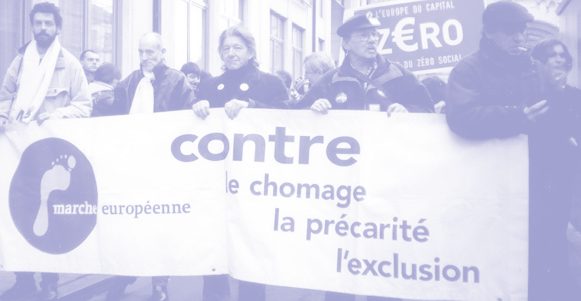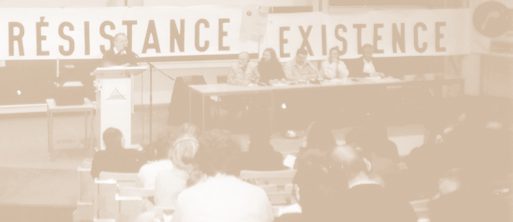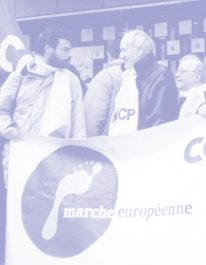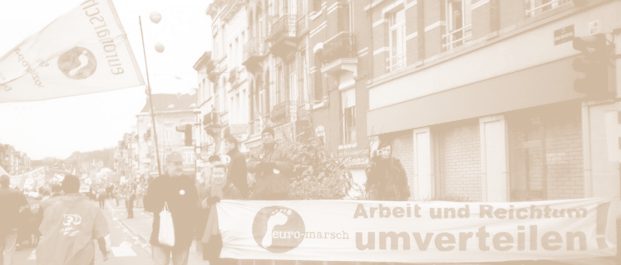

 |
 |
 |
 |
 | ||
European Marches
|
||||||||||||||
| ||||||||||||||
What in the future? |
||||||||||||||
The Unemployed in RussiaSummary of Eric Aragon's intervention (member of the working group on Eastern enlargement of the ESF), from data given by Carine Clément (Attac-Russia) 
Unemployment rate following the ILO standards: 8% of the working population (5, 8 million). Unemployment rate officially registered by the state services: 2, 2 (1, 6 million of whom 32400 in Chechnya). The difference finds its explanation in the fact that unemployment benefits are infrequently paid and employment services are very limited. Since the 2001 reforms, funds from employment do not run the benefits system anymore. The funds are integrated into a state budget line. It aims at reducing the amount of allowances by setting a maximum (the regional subsistence level) and at reallocating to everybody about the same amount. Before 2001, employers used to pay a contribution to the fund for employment equivalent to 1,5% of the wage bill. Since the 2001 reform, they pay a « single social tax » equivalent to 28% and covering at the same time pensions, health insurance, unemployment insurance and any other social insurance (family etc.). Needless to say that in the frame of the reform bills of the new government, there is a cut of the « single social tax » to 20%. Most of the unemployed do not receive any allowance (even among those who have registered, 20% to 50% do not have any allowance). Those who have not registered do not receive any allowance. As for those who are registered, if they refuse more than two proposals of a job in a ten day period, they are removed from the list. It is forbidden to remain for more than one year on the list… the amount of the allowances is highly regressive. In theory, allowances are based on the salary of the last three months. They actually represent on average between 10% and 30% of the average wage: i.e. in January 2004 from 600 to 1800 roubles a month (so from 15 to 45 euros). In 2001, less than half of all beneficiaries were receiving allowances worth around the minimal ceiling, i.e. from 100 to 300 roubles (3 to 10 euros) a month or from 6.7 to 20% of the subsistence level. It is important to highlight the importance of hidden or informal unemployment as well as of illegal work. As far as non registered and non entitled unemployed are concerned (among whom the great majority are workers who « voluntary resign » following strong intimidation by the management), one also has to add the workers with a fragile or completely illegal status, illegal work, low paid jobs, informal work etc. A great many workers remain on the firm’s list of employed (in order to get a status, and to benefit from the social services of the firm) but they actually work elsewhere or in the firm, in a position outside the official accountancy of the firm. The situation of undeclared unemployed is characterized by the low level of allowances and the quasi-inexistence of professional qualification programs and assistance programs for obtaining employment. Women and elderly people are the most affected (middle aged men prefer using informal work). There is hardly any unemployed movement claiming a rise in allowances. There are psychological brakes – « being unemployed is disgraceful, it is parasitism » – and social brakes – the « atomization » of the unemployed. The struggles that have taken place occurred right after the closure of firms, when the workers collectives still existed. Then it was about the struggles for the collection of debts owed to employees using different forms of action in order to recover a part of the remaining assets after the selling off of the company assets (for instance in Ajero-Soudjensk near Volodia). The other problem in relation to struggle is informal work or unemployment. In my opinion, it is even more important though more difficult to use the traditional methods of struggle. That's the economy of individual survival and resourcefulness (which concerns almost everyone, including workers formally employed with full status). How to organize people? At this time, there is no real example in this field. Ideas and prospects:
Prospects of openness require the highlighting of the European movements of unemployed in the arena given to us. In the frame of the European initiatives such as the ESF, we have present the issues of the East in a determined way by proposing for instance, that a general assembly of the ESF takes place in one of the eastern countries such as in Poland or Hungary. The working group on « Eastern enlargement » in the ESF is willing to continue to fully play its role as interface between Eastern countries and the ESF and to help to carry out the demands of Eastern countries. |
Content | |||||||||||||
|
<< Common social rights to every resident in the European Union << Women and precariousness in Spain A European and misogynistic constitutional treaty which usurps women's conquests >> LISBON AGENDA: More and Better Jobs? >> Report of the four working groups >> 
02/08/04
|
||||||||||||||